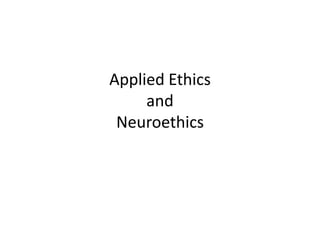
Lecture 2
- 1. Applied Ethics and Neuroethics
- 2. Applied Ethics • “Applied ethics” – a separate discipline from pure or philosophical ethics? • Fill-in-the-blank ethics: – Business ethics – Legal ethics – Environmental ethics – Bioethics
- 3. Bioethics case 1 Baby Boy B is a patient in the NICU. He was born immature and developed multiple complications of prematurity, including respiratory failure requiring mechanical ventilation. He also developed multi-organ system failure and a large intracranial hemorrhage, but he was not technically brain dead. His prognosis was extremely poor and, after one week of aggressive care, the NICU staff persuaded his parents that withdrawal of life support was in his best interests. So today the NICU staff wrote an order for the patient to be removed from the ventilator and extubated. After extubation, he would be treated with sedatives (which he was already receiving). However, the NICU nurse tells the NICU doctor that Baby Boy B is not moving anything, most likely since, just 1 hour ago, he got a dose of a paralytic (given when someone is on a ventilator). Because of his multi-organ system failure, however, the effect of the paralytic will be irreversible for quite a long time and could last for perhaps 1 – 2 days or even longer. The parents are telling the NICU nurses and doctors that they want their preference carried out immediately: remove their baby from the machines and let him die in peace. The NICU has no empty beds but has two neonates at other hospitals on a waiting list with potentially treatable conditions if they were transferred to this hospital’s NICU. The NICU staff refuses to remove the baby from the ventilator while still paralyzed since they say that doing so would constitute euthanasia.
- 4. Bioethics case 2 A premature baby has severe intracranial hemorrhage and meets clinical criteria for “brain death.” The NICU team wants to confirm the diagnosis by having tests done since the parents refuse to believe that their baby is dead. The parents refuse to give permission for the test. Plus they state that even if the death showed no blood circulation, they would not allow the ventilator to be removed from their child.
- 5. Bioethics case 3 A 75-year-old woman is admitted to the ICU with ascending paralysis due to acute Guillain-Barre Syndrome (GBS). She got emergently intubated and ventilated upon arrival, and then treated with plasma exchange. Based on the EMG results, the neurologist thinks her prognosis for full recovery is excellent. Her pre-hospital state was excellent, e.g., she was totally lucid and functional in all respects in her own home. However, she’s got an ICU psychosis, which is extremely upsetting to her daughter. The daughter feels her mother is being tortured and that the ventilator should be removed to end her suffering. The mother gave her daughter the Durable Power of Attorney for Health Affairs.
- 6. Bioethics case 4 An 80-year-old woman got a high-risk open-heart procedure and has been on the ventilator for 3 weeks post-operatively. The team is not able to wean her off the machine; in fact, she’s getting worse slowly and her prognosis for recovery was poor. She’s heavily sedated and unable to express her wishes. She has a valid living will that expressly mentioned chronic ventilator dependency as something she wouldn’t have wanted and she also gave her son, a minister, a valid Durable Power of Attorney for Health Affairs. The son confers with all the family members and makes the decision to ask that his mother be removed from the ventilator, made comfortable, and allowed to die. Unfortunately, her attending surgeon refused the son’s request. (You had heard rumors of some surgeons in the hospital, who delayed removal of life-support for 30 days post-op so that it wouldn’t be counted as an operative death and thus not stain their record).
- 7. Applied Ethics • “Applied ethics” – a separate discipline from pure or philosophical ethics? • Fill-in-the-blank ethics: – Business ethics – Legal ethics – Environmental ethics – Bioethics – Neuroethics
- 8. Neuroethics • What neuroscientists should and shouldn’t do • What people should and shouldn’t do with neurotechnologies • How the “neuroscience worldview” affects how we think about, and treat, each other